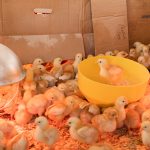Cohabitation of ducks and chickens presents unique challenges due to their distinct needs and behaviors. Ducks are aquatic birds with a natural affinity for water, while chickens are terrestrial fowl. This fundamental difference can lead to conflicts in shared living spaces.
Ducks tend to create wet, muddy environments that are unsuitable for chickens, potentially causing health issues and stress for the latter. To successfully manage a mixed flock, it is essential to provide separate living areas tailored to each species’ requirements. Physical barriers, such as fencing or partitions, can effectively keep ducks and chickens apart while still allowing them access to their respective optimal environments.
Natural deterrents, such as strategically placed vegetation or specific landscaping features, can also discourage ducks from entering chicken-designated areas. Careful observation of interactions between ducks and chickens is crucial for maintaining a peaceful coexistence. This monitoring allows for prompt intervention if any aggressive behavior or stress-inducing situations arise.
By implementing these strategies and understanding the unique needs of both species, poultry keepers can create a safe and comfortable environment that promotes the health and well-being of both ducks and chickens in a mixed flock setting.
Table of Contents
- 1 Understanding the Differences Between Ducks and Chickens
- 2 Creating Separate Living Spaces for Ducks and Chickens
- 3 Implementing Physical Barriers to Keep Ducks Away from Chickens
- 4 Utilizing Natural Deterrents to Prevent Ducks from Interfering with Chickens
- 5 Monitoring and Managing Interactions Between Ducks and Chickens
- 6 Conclusion and Tips for Successfully Keeping Ducks Away from Chickens
- 7 FAQs
Key Takeaways
- Ducks and chickens have different needs and behaviors, so it’s important to understand the differences between the two species.
- Creating separate living spaces for ducks and chickens can help minimize conflicts and ensure the well-being of both animals.
- Implementing physical barriers such as fences and netting can effectively keep ducks away from chickens and prevent unwanted interactions.
- Natural deterrents like predator decoys, reflective objects, and strong-smelling plants can also help discourage ducks from interfering with chickens.
- Regular monitoring and proactive management of interactions between ducks and chickens are essential for successfully keeping them separate and minimizing conflicts.
Understanding the Differences Between Ducks and Chickens
Habitat and Dietary Needs
Ducks, being waterfowl, are naturally drawn to water, whereas chickens are ground-dwelling birds that do not share the same affinity for water. Moreover, ducks have messier eating and drinking habits, often splashing water and scattering food around, unlike chickens.
Nutritional Requirements
Ducks have different nutritional needs compared to chickens, requiring a diet higher in niacin and lower in salt. It is essential to understand these differences when keeping ducks and chickens together to ensure proper accommodation of each species’ specific needs.
Behavioral Differences and Coexistence
In terms of behavior, ducks are generally more independent and less hierarchical than chickens. Chickens have a pecking order and can be aggressive towards ducks, especially during feeding time. Ducks, on the other hand, are more peaceful and may not be able to compete with chickens for food, leading to potential issues such as malnutrition or stress for the ducks. By understanding these behavioral differences, you can better manage the interactions between ducks and chickens and create a more harmonious living environment for both species.
Creating Separate Living Spaces for Ducks and Chickens

One of the most effective ways to keep ducks away from chickens is to create separate living spaces for each species. Ducks require access to water for swimming and bathing, so providing them with a pond or shallow pool in their living area is essential. This will not only keep the ducks occupied and content but also prevent them from encroaching on the chickens’ territory in search of water.
Additionally, ducks should have access to a sheltered area for nesting and protection from predators. For chickens, a separate coop with nesting boxes and perches should be provided. This will allow the chickens to roost and lay eggs without interference from the ducks.
By creating distinct living spaces for ducks and chickens, you can minimize the chances of conflict between the two species and ensure that each has access to the resources they need for their well-being.
Implementing Physical Barriers to Keep Ducks Away from Chickens
In addition to separate living spaces, implementing physical barriers can help keep ducks away from chickens. Fencing is an effective way to create boundaries between the two species’ living areas. For ducks, a fence around their pond or pool can prevent them from wandering into the chicken coop area.
Additionally, a fence around the chicken coop can keep ducks from entering and causing disturbances. It’s important to ensure that the fencing is secure and tall enough to prevent ducks from flying over or climbing under it. Chicken wire or hardware cloth can be used to reinforce the fencing and prevent any gaps that ducks could exploit to gain access to the chickens’ area.
By implementing physical barriers, you can effectively separate ducks and chickens while still allowing them to coexist on the same property.
Utilizing Natural Deterrents to Prevent Ducks from Interfering with Chickens
Natural deterrents can also be used to prevent ducks from interfering with chickens. Planting dense shrubs or bushes around the perimeter of the chicken coop can create a barrier that ducks are less likely to penetrate. Ducks prefer open spaces near water, so creating a dense, vegetated buffer zone can discourage them from venturing into the chicken area.
Another natural deterrent is the use of predator decoys, such as fake owls or hawks, near the chicken coop. Ducks are wary of predators and may avoid areas where they perceive a threat. By strategically placing predator decoys around the chicken coop, you can deter ducks from approaching and causing disturbances.
Monitoring and Managing Interactions Between Ducks and Chickens

Observing Behavior and Identifying Potential Conflicts
Monitoring interactions between ducks and chickens is crucial for maintaining a harmonious living environment for both species. Observing their behavior during feeding time, roosting, and nesting can provide valuable insights into any potential conflicts or issues that may arise. If you notice any aggression or competition between the two species, it’s important to intervene and make adjustments to their living arrangements or feeding routines.
Providing Adequate Resources for Both Species
Managing interactions between ducks and chickens also involves providing adequate resources for both species. This includes ensuring that each has access to food, water, shelter, and nesting areas without competition or interference from the other.
Preventing Conflicts and Ensuring Well-being
By closely monitoring their interactions and managing their living conditions, you can prevent conflicts and ensure the well-being of both ducks and chickens.
Conclusion and Tips for Successfully Keeping Ducks Away from Chickens
In conclusion, keeping ducks away from chickens requires an understanding of their differences in behavior, diet, and habitat requirements. Creating separate living spaces, implementing physical barriers, utilizing natural deterrents, and monitoring interactions between the two species are essential for maintaining a harmonious environment for both ducks and chickens. Some additional tips for successfully keeping ducks away from chickens include providing ample space for both species to roam and explore, offering enrichment activities such as foraging opportunities or toys to keep them occupied, and ensuring that each species has access to their specific dietary needs without competition from the other.
By following these guidelines and tips, you can effectively keep ducks away from chickens while promoting the well-being of both species in a shared living environment. With proper management and understanding of their unique needs, ducks and chickens can coexist peacefully on the same property.
If you’re looking for ways to keep ducks away from your chickens, you may also be interested in learning about the incubation period for goose eggs. Check out this article to gain insight into the breeding and hatching process for geese, which may provide helpful information for managing different types of poultry on your farm.
FAQs
Why should I keep ducks away from chickens?
Ducks and chickens have different housing and dietary needs, and keeping them together can lead to competition for resources and potential health issues for both species.
What are the potential problems of keeping ducks and chickens together?
Ducks can be carriers of certain diseases that are harmful to chickens, and their larger size and different feeding habits can lead to aggression and bullying towards the chickens.
How can I keep ducks away from chickens?
You can keep ducks and chickens separate by providing separate housing, feeding areas, and water sources for each species. Fencing can also be used to create separate enclosures for ducks and chickens.
What are the benefits of keeping ducks and chickens separate?
Keeping ducks and chickens separate can help prevent the spread of diseases, reduce competition for resources, and create a more harmonious living environment for both species.
Can ducks and chickens ever be kept together?
While it is possible to keep ducks and chickens together, it requires careful management and monitoring to ensure the well-being of both species. It is generally recommended to keep them separate if possible.
Meet Walter, the feathered-friend fanatic of Florida! Nestled in the sunshine state, Walter struts through life with his feathered companions, clucking his way to happiness. With a coop that’s fancier than a five-star hotel, he’s the Don Juan of the chicken world. When he’s not teaching his hens to do the cha-cha, you’ll find him in a heated debate with his prized rooster, Sir Clucks-a-Lot. Walter’s poultry passion is no yolk; he’s the sunny-side-up guy you never knew you needed in your flock of friends!







